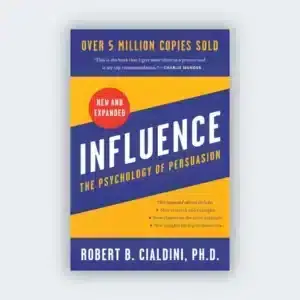Book Overview
Influence: The Psychology of Persuasion by Robert B. Cialdini is a ground-breaking work that explores the psychology of why people say “yes” and how they might use these ideas to morally influence others. Widely regarded as a must-read in fields like marketing, leadership, sales, and personal growth, Cialdini combines research and storytelling to explain the subtle yet powerful techniques behind persuasion.
About the Author
Dr. Robert B. Cialdini is a Renowned psychologist and Emeritus Regents Professor of Psychology and Marketing at Arizona State University. With a deep focus on the science of influence and persuasion, Cialdini is considered a leading expert in understanding the factors that shape human decisions. His extensive research has made him a trusted figure in both academic and professional circles.
Core Principles of Persuasion
In Influence, Cialdini identifies six universal principles that drive human behavior and influence decision-making. These principles, grounded in psychological research, help explain why people are often swayed by certain tactics—sometimes without even realizing it. Below, we explore the six key principles that form the foundation of Cialdini’s work:
- Reciprocity The principle of reciprocity revolves around the idea that people feel compelled to return favors. According to Cialdini, providing something of value to people first produces a sense of obligation, often leading to them responding positively to our requests. By giving before asking, we increase the likelihood of receiving in return.
- Commitment and Consistency Once people commit to a particular choice or action, they are likelier to stick with it, even if circumstances change. Cialdini explores how this psychological bias can be used to encourage others to act in alignment with their past decisions, making them more consistent in their actions.
- Social Proof Human behavior is often influenced by what others are doing, especially in uncertain situations. Cialdini illustrates how people tend to follow the crowd or mimic behaviors they observe in others. By showing that a particular behavior or decision is popular or widespread, individuals can use social proof to encourage others to follow suit.
- Authority People are more likely to listen to and be convinced by those in positions of strength. Cialdini explores why we trust experts and figures with perceived expertise. He outlines how establishing authority—whether through credentials, experience, or reputation—can be a powerful tool in influencing others.
- Liking people are more likely to be influenced by people they love or admire. Cialdini highlights how similarities, compliments, and shared interests contribute to building rapport and trust. Fostering positive relationships can increase one’s chances of gaining cooperation and support.
- Scarcity, the principle of scarcity, is based on the idea that people place a higher value on things they perceive as limited or rare. Cialdini explains how creating a sense of urgency—whether by limiting availability or offering exclusive opportunities—can lead to heightened demand and prompt quicker action.
Real-World Applications
Throughout the book, Cialdini uses compelling real-world examples and case studies to demonstrate how these principles work in everyday life. From business marketing campaigns to personal interactions, readers are shown how to apply these principles effectively. By understanding how persuasion works, individuals can improve their communication skills, enhance their ability to influence others and make better decisions in various situations.
Ethical Use of Persuasion
One of the central themes of Influence is the ethical use of persuasion. Cialdini stresses that while these principles can be powerful tools for influencing others, they must be applied responsibly. He warns against using these techniques to manipulate or deceive, urging readers to apply them to benefit both the persuader and the recipient. By using persuasion ethically, we can foster trust and create positive, lasting relationships.
Who Should Read This Book?
Influence is a valuable resource for anyone in sales, marketing, leadership, or customer service. It’s also an essential read for individuals who want to understand better how persuasion works in their everyday lives and how to recognize when they are being influenced. Whether you’re trying to improve your professional interactions or want to become more aware of the subtle tactics used by others, this book offers practical advice that can be applied in any situation.
Conclusion
With its insightful exploration of the psychology behind persuasion, Influence: The Psychology of Persuasion remains a timeless guide to understanding and harnessing the power of influence. Cialdini’s work has shaped how professionals approach persuasion and communication, providing readers with valuable tools to navigate personal and professional interactions. By using these principles ethically, readers can foster better connections, make more informed decisions, and influence others positively.
Looking for more insightful reads? Check out our collection of “Psychology Books” and explore the fascinating world of human behavior and influence.








Reviews
There are no reviews yet.